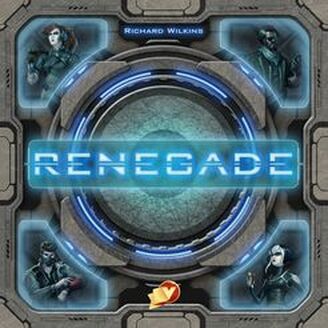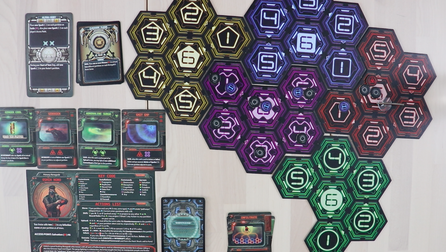 What is this game about? Renegade, designed by Richard Wilkins and published by Victory Point Games, is a cooperative, deck-building area control game in which you (and other players, if you want them) are hackers who are fighting against an evil, matrix-like computer that controls humankind. Your main objective is to survive until the end of the game—the AI will consistently throw "countermeasures" at you that erase the work you're doing and flood the network with hostile Sparks and Guardians. You must manage these threats: If at any time you need to put another Spark or Guardian on the board, but find that the supply is empty, you'll lose the game. At the same time, you'll be improving your own deck (new cards go directly into your hand!) while using your cards to destroy enemy countermeasures, move, turn the AI's Sparks into your own allied pieces, and even create "uplinks" that let you influence activities all across the board, regardless of your avatar's location within the network. A game of Renegade takes place in three-turn rounds. During each round, you'll work through your entire 15-card deck (your deck is always 15 cards—you get rid of an old card every time you purchase an upgrade), and you will pursue increasingly difficult goals each round. The objectives are divided into three categories: Copper (easier), Silver (medium), and Gold (difficult). The number of challenges you'll face at each difficulty level is determined by which AI boss you intend to fight. Renegade comes with several of them, from the relatively tame Alpha-Moby to the brutal and decidedly-not-nurturing "Mother." While technically you do not have to succeed at all or even any of your objectives—you only have to still be standing at the end—you are punished with in-game consequences for failing them. You'll also get fewer points when you calculate your score to see how well you did. You may "win" the game by surviving to the end, but you triumph by getting a high score. How does it play solo? Renegade feels more like a solo game that was expanded to accommodate more players than a multiplayer game with a solo mode. This is not at all surprising. Its designer, Richard Wilkins, is better known as Ricky Royal, a mainstay of the solo gaming community! Renegade is a cooperative game, but it scales down well—your objectives change depending on how many players are in the game, and you get bonuses to compensate for a lack of allies to help you cover the entire network. It feels completely natural to play either true solo or two-handed, and I enjoy it both ways.  Set up for a battle against Alpha-Moby! Set up for a battle against Alpha-Moby! Overall Thoughts Renegade is a fantastic game. I have played it a lot, I want to keep playing it, and I can't wait to see the expansions in store for it. If you enjoy puzzly games with multiple solutions to a given problem, then Renegade is a great match for you. I love figuring out the smartest ways to upgrade and deploy my cards, and it's so satisfying to pull off good combos. You are subject to the whims of fortune in some ways—you might not always draw the cards you need, or you might get objectives that are difficult in combination with each other, or you could have a bad die roll that results in a badly-placed Spark or the destruction of one of your viruses. But Renegade is overall one of those games where skill really pays off, and where intimate knowledge of what the game can do truly feels rewarding. The deck-building aspect of Renegade is immediate and exciting. Each turn, you can purchase cards from a market row that go directly into your hand, while culling the weaker cards you used to pay for them. I personally love getting to use my newer, better cards right away, and I like that choosing which ones to buy and how to deploy them can have an immediate effect on the game. I'd actually like to see more options in upcoming expansions to the game—there are only 36 advanced cards in the base game, and I am hungry for more variety! (In fairness, there are a couple of expansion packs available already.) I also love the various ways that in-game actions combine with each other. Some of your contaminants, like viruses, have more obvious in-game uses. But figuring out how to use uplinks—contaminants that allow you to push game pieces around from the other side of the board, or in some cases to project yourself to another location and act as if you were actually there—really takes Renegade to the next level for me. That said, Renegade has its flaws. While I haven't played it at higher player counts, I think it might be best for one or two players. There is a lot going on, and I personally love to agonize over my game turns. The box says 90 minutes, and I'd say it takes me 60–90 minutes to play a full game by myself, depending on the difficulty level. Most importantly, however, Renegade hurts itself a little by having a high cost of entry. The rulebook is not an easy read, and it is made more difficult by the inclusion of a lot of thematic jargon that is difficult to keep track of, especially when you are new to the game. Once you've gotten the hang of things, Renegade flows well and is tremendously absorbing. But I still refer to "Faith" as the "Purple Server" and to the "Infect" action as "Attack." Do I recommend it? YES. I absolutely recommend Renegade. If you like intense, brain-burning games that present you with interesting decisions, but don't take an eternity to set up and play solo, you will love this one. Overall Rating: 4.5 stars 5 stars — I love it! 4 stars — I really like it. 3 stars — I like it. 2 stars — It's okay. 1 star — Meh. Enjoy this review? Want to support my site? Buy me a coffee here!
2 Comments
8/6/2019 02:02:51 pm
You can try my "How to Solo" series for it, if you want! Here's me playing the tutorial, and I have an Alpha-Moby vid in the same playlist: https://youtu.be/lNXqa9dlQO0
Reply
Your comment will be posted after it is approved.
Leave a Reply. |
AuthorMy name is Liz Davidson, and I play solo board games. A lot of solo board games... Archives
August 2021
Categories
All
|
 RSS Feed
RSS Feed